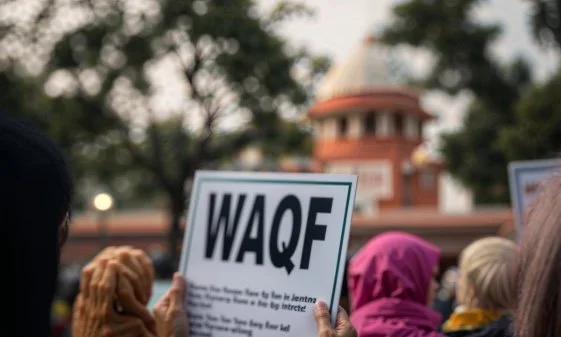Waqf (Amendment) Act 2025 Partially Stayed by Supreme Court
Court Pauses Enforcement of Contentious Rules on Religious Status and Land Ownership Disputes
September 15, 2025
The Supreme Court has temporarily blocked certain parts of the Waqf (Amendment) Act, 2025, a law that governs how Muslim religious and charitable properties are managed in India. The Court’s interim order, delivered on Sept. 14, comes in response to widespread legal challenges from political leaders and Muslim organisations. The judges noted that it is rare for courts to pause the implementation of a law passed by Parliament, and such action is taken only when there is a strong legal basis.
In this case, while the petitioners challenged the entire amendment, the Court found only a few provisions that appeared to raise immediate constitutional concerns, as reported by LiveLaw.
First, let’s see what the issue is. A waqf is a permanent dedication of property by a Muslim for religious, charitable, or public welfare purposes. The property, once declared as waqf, cannot be sold or transferred, and its benefits must be used as intended, such as maintaining mosques, supporting education, or helping the poor. In India, the Waqf Act, first passed in 1995, provides the legal framework to manage such properties. It allows the creation of Waqf Boards at the state and central levels to oversee and regulate waqf properties across the country.
In April 2025, the Indian Parliament passed the Waqf (Amendment) Act, introducing several major changes. One key change was that only Muslims who had been practising Islam for at least five years could create a waqf. The amendment also allowed government officials to decide whether certain waqf lands were actually government-owned, and gave them the power to update land records based on their findings. It abolished the concept of waqf-by-user (where land could be treated as waqf based on long-standing religious use), banned new waqfs in Scheduled Areas and on protected monuments, applied time limits for claiming waqf properties under the Limitation Act, and allowed non-Muslims to serve on waqf boards and even be appointed as CEOs.
These changes sparked strong opposition from various Muslim organisations, political leaders and civil society groups. Critics said the amendments violated minority rights, gave the government too much control over religious properties and weakened the autonomy of waqf institutions. The requirement of five years of Islamic practice was seen as vague and difficult to enforce fairly. Giving a government officer the power to declare waqf land as government land was viewed as unconstitutional, as it bypassed judicial procedures. Petitioners also argued that the removal of waqf-by-user would endanger thousands of longstanding religious sites that had never been formally registered.
On Sept. 14, one of the key provisions that the order, delivered by a bench of Chief Justice B.R. Gavai and Justice A.G. Masih, put on hold is the requirement that a person must have been a practising Muslim for five years before they can create a Waqf. The Court said this rule cannot be applied until state governments frame clear procedures to decide whether someone meets that five-year condition. Without such a process, the rule could be misused or applied unevenly.
The Court did not say the five-year requirement was wrong in itself. It agreed that the rule was meant to prevent misuse of Waqf law by people who might convert only to avoid debts or legal claims. But until a fair system is in place to check such cases, the rule cannot be used.
The Court also stopped the government from applying another part of the law that deals with property disputes. The amendment allowed a government officer, like a Collector, to decide whether land claimed by a Waqf is actually government land. The Court said this violates the basic principle that only a court or tribunal should decide such disputes. Allowing the executive to decide ownership of land goes against the idea of separation of powers.
The Court said that until a proper tribunal or court gives its final decision on who owns the land, the Waqf cannot be removed from it and the records must remain unchanged. However, while the case is pending, no new person can be given rights over the disputed land.
The Court placed limits on the number of non-Muslims who can be members of Waqf institutions. It said the Central Waqf Council can have no more than four non-Muslim members out of 22. Similarly, the State Waqf Boards can have no more than three non-Muslim members out of 11. These limits will apply for now, though the Court did not strike down the provision allowing non-Muslim members.
On the question of appointing non-Muslims as Chief Executive Officers (CEOs) of State Waqf Boards, the Court did not block this part of the law. It noted that the provision is valid for now but advised that, wherever possible, a Muslim should be chosen for the post.
The Court also chose not to interfere with other contested parts of the law. These include the removal of the concept of waqf-by-user, the ban on creating waqfs in Scheduled Areas and on protected monuments, the condition that only Muslims can create waqfs and the application of the Limitation Act to Waqf cases. The Court said there was no strong enough reason at this stage to stop these provisions from taking effect.
Both sides will have a chance to present full arguments about the legality of the amendments, and the Court will decide later whether these changes can stand.
You have just read a News Briefing by Newsreel Asia, written to cut through the noise and present a single story for the day that matters to you. Certain briefings, based on media reports, seek to keep readers informed about events across India, others offer a perspective rooted in humanitarian concerns and some provide our own exclusive reporting. We encourage you to read the News Briefing each day. Our objective is to help you become not just an informed citizen, but an engaged and responsible one.

